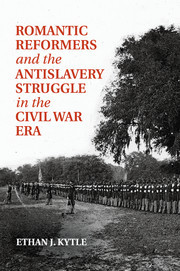Description
Romantic Reformers and the Antislavery Struggle in the Civil War Era
Author: Kytle Ethan J.
Romantic Reformers is an intellectual history of the American antislavery movement in the 1850s and early 1860s.
Language: English
Subject for Romantic Reformers and the Antislavery Struggle in the...:
Approximative price 31.58 €
In Print (Delivery period: 14 days).
Add to cart
Romantic Reformers and the Antislavery Struggle in the Civil War Era
Publication date: 03-2016
Support: Print on demand
Publication date: 03-2016
Support: Print on demand
Approximative price 82.73 €
In Print (Delivery period: 14 days).
Add to cart
Romantic Reformers and the Antislavery Struggle in the Civil War Era
Publication date: 08-2014
313 p. · 15.8x23.6 cm · Hardback
Publication date: 08-2014
313 p. · 15.8x23.6 cm · Hardback
Description
/li>Contents
/li>Biography
/li>
On the cusp of the American Civil War, a new generation of reformers, including Theodore Parker, Frederick Douglass, Harriet Beecher Stowe, Martin Robison Delany and Thomas Wentworth Higginson, took the lead in the antislavery struggle. Frustrated by political defeats, a more aggressive Slave Power, and the inability of early abolitionists like William Lloyd Garrison to rid the nation of slavery, the New Romantics crafted fresh, often more combative, approaches to the peculiar institution. Contrary to what many scholars have argued, however, they did not reject Romantic reform in the process. Instead, the New Romantics roamed widely through Romantic modes of thought, embracing not only the immediatism and perfectionism pioneered by Garrisonians but also new motifs and doctrines, including sentimentalism, self-culture, martial heroism, Romantic racialism, and Manifest Destiny. This book tells the story of how antebellum America's most important intellectual current, Romanticism, shaped the coming and course of the nation's bloodiest - and most revolutionary - conflict.
Introduction; 1. The transcendental politics of Theodore Parker; 2. Frederick Douglass, perfectionist self-help, and a constitution for the ages; 3. Harriet Beecher Stowe and the divided heart of Uncle Tom's Cabin; 4. African dreams, American realities: Martin Robison Delany and the emigration question; 5. Thomas Wentworth Higginson's war on slavery; Conclusion: Emancipation Day, 1863; Epilogue: the reconstruction of Romantic reform.
Ethan J. Kytle is Associate Professor of History at California State University, Fresno. He was a postdoctoral fellow at the Avery Research Center for African American History and Culture in Charleston, South Carolina, and has been awarded the Mary Kelley Prize by the New England American Studies Association.
© 2024 LAVOISIER S.A.S.
These books may interest you

American Abolitionists 160.25 €



